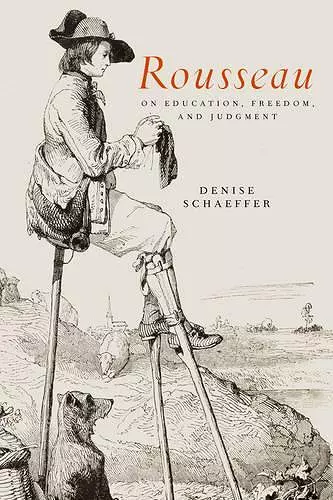Rousseau on Education, Freedom, and Judgment
Format:Paperback
Publisher:Pennsylvania State University Press
Published:15th Jan '16
Currently unavailable, our supplier has not provided us a restock date
This paperback is available in another edition too:
- Hardback£68.95(9780271062099)

In Rousseau on Education, Freedom, and Judgment, Denise Schaeffer challenges the common view of Rousseau as primarily concerned with conditioning citizens’ passions in order to promote republican virtue and unreflective patriotism. Schaeffer argues that, to the contrary, Rousseau’s central concern is the problem of judgment and how to foster it on both the individual and political level in order to create the conditions for genuine self-rule. Offering a detailed commentary on Rousseau’s major work on education, Emile, and a wide-ranging analysis of the relationship between Emile and several of Rousseau’s other works, Schaeffer explores Rousseau’s understanding of what good judgment is, how it is learned, and why it is central to the achievement and preservation of human freedom. The model of Rousseauian citizenship that emerges from Schaeffer’s analysis is more dynamic and self-critical than is often recognized. This book demonstrates the importance of Rousseau’s contribution to our understanding of the faculty of judgment, and, more broadly, invites a critical reevaluation of Rousseau’s understanding of education, citizenship, and both individual and collective freedom.
“Rousseau on Education, Freedom, and Judgment is a splendid book. Denise Schaeffer treats an enormously complex question in a way that is simple, elegant, and altogether free of jargon. She first shows how each stage of Emile’s education is always double—meant seriously, but also designed to prepare for its own supersession—and then reveals this educational sequence also at work in Rousseau’s education of his reader. The quite considerable achievement of Schaeffer’s book is to employ the same sequence in her own writing, where the straightforward political issue with which she begins is gradually deepened and gives way to the question of what it is about the human soul that requires this sort of indirect education. Rousseau on Education, Freedom, and Judgment will be regularly read by Rousseau scholars and advanced students, but owing to the accessibility, and really the beauty, of its prose, it will inevitably find its way to a broader audience of students of philosophy and political theory at every level.”
—Michael Davis, Sarah Lawrence College
“Most of Rousseau's readers think that he fears complexity, ambiguity, and tension. Schaeffer presents Rousseau as an indispensable guide to confronting these unavoidable features of our personal and political lives. Schaeffer’s interpretation of Rousseau as a teacher of judgment is unprecedented but thoroughly convincing. Moreover, Schaeffer convinces me and will convince many others that we need Rousseau’s account of judgment to deepen our understanding of reflective citizenship. This book consequently makes an important contribution not only to the study of Rousseau but also to the study of politics.”
—Jonathan Marks, Ursinus College
“Man or citizen, nature or perfectibility, wholeness or alienation: Rousseau’s readers have puzzled over the dichotomies that run through his thought and that seem to offer irreconcilable alternatives or tragic choices. In her insightful book, Denise Schaeffer runs straight through the breach of these either/or dilemmas by examining how Rousseau confronts his reader with alternatives in order to educate the reader’s judgment in making the choices that necessarily confront us as beings that are, according to Rousseau, naturally good but corrupted in society. Schaeffer focuses on Emile, which Rousseau considered to be his best and most important work, by following the stages of Emile’s education in judgment at the hands of his tutor, a process that at the same time educates the reader. Schaeffer’s persuasive reading of Emile is itself an education in how to read Rousseau.”
—John T. Scott, University of California, Davis
“Denise Schaeffer’s new book directs long-overdue attention to the place of judgment in Rousseau’s political thought and presents a forceful challenge to those who believe that his conception of citizenship demands an unreflective identification with the community that precludes any exercise of critical judgment. Schaeffer presents a distinctive reading of Emile that brings out the profound significance of Rousseau’s frequent repetitions, his apparent contradictions, and his curious device of introducing multiple versions of his principal characters—of Emile, of Sophie, and even of himself. By such literary inventions, Schaeffer argues, Rousseau demonstrates the cultivation of judgment in his protagonists and cultivates his readers’ judgment. Readers who already possess the virtue of good judgment will want to read Schaeffer’s new book; readers lacking such judgment need to read it.”
—Joseph R. Reisert, Colby College
“Rousseau is often thought of as a thinker of incompatible extremes. Through her careful exposition of Rousseau’s understanding of judgment, Denise Schaeffer joins those who see him, instead, as a thinker who uses critical examination of these extremes to locate a middle ground. In particular, she demonstrates that in Emile (and elsewhere in his works), Rousseau portrays not one but several educations, using their twists and turns to develop the judgment of his readers. Schaeffer contributes to this development of judgment by offering fresh interpretations and provocative judgments of her own.”
—Christopher Kelly, Boston College
“That Schaeffer’s reconstruction of judgment in Rousseau’s work provides a fresh lens of analysis for engaging with some of the most contentious debates among Rousseau scholars, and simultaneously adds a new and important voice to the ongoing conversation about the role of judgment in democracy, speaks to the significance of this work to the field of political theory broadly speaking.”
—Jennifer Einspahr The Review of Politics
“Schaeffer’s book is original, insightful, and stimulating—offering a promising means by which to rescue Rousseau from those who would diminish his contributions to democratic theory.”
—David Lay Williams The Historian
ISBN: 9780271062105
Dimensions: 229mm x 152mm x 20mm
Weight: 386g
240 pages